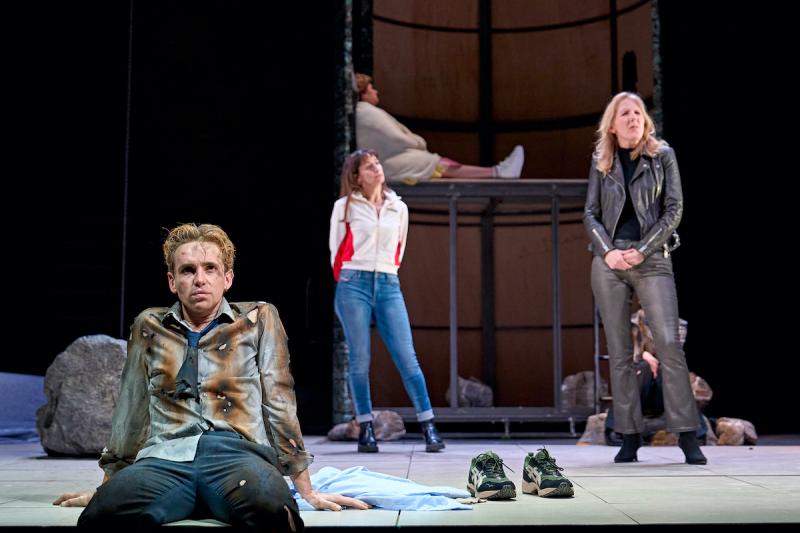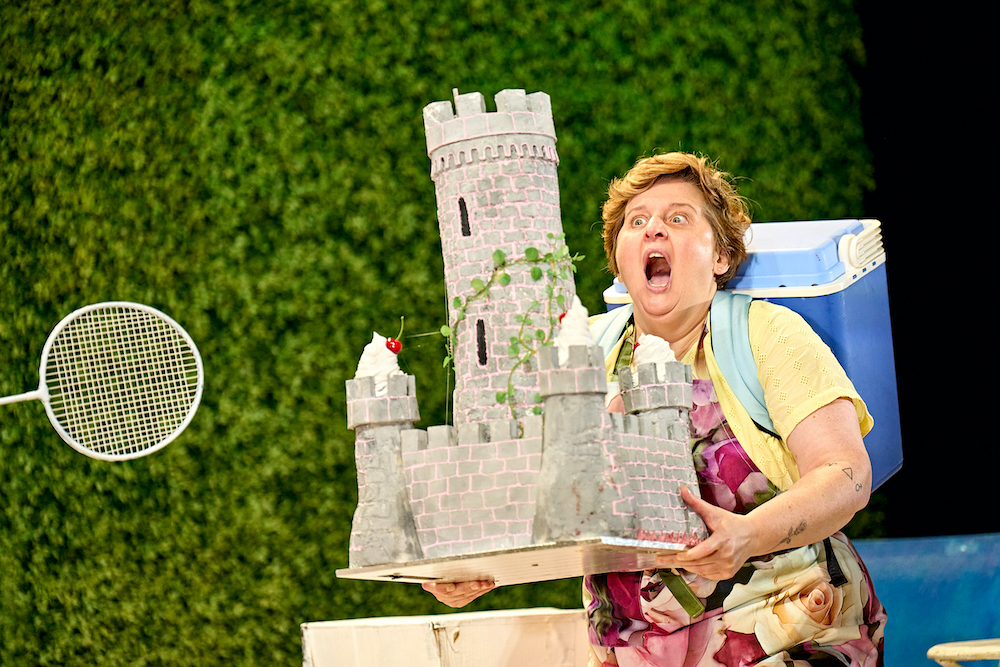Mates in Chelsea, Royal Court review – silly rather than satirical | reviews, news & interviews
Mates in Chelsea, Royal Court review – silly rather than satirical
Mates in Chelsea, Royal Court review – silly rather than satirical
New comedy about toffs and tycoons is disappointingly juvenile and weak

As Christmas looms, ’tis the season for comedy. And even the traditionally austere Royal Court feels obliged to join in. So here we go again with the same team — writer Rory Mullarkey and director Sam Pritchard — who brought the colourfully cartoonish Pity to this venue in 2018.
The story begins, in classic Wilde and Wodehouse style, with the aristocratic Theodore “Tug” Bungay (Kynaston) and his public school chum Charlton “Charlie” Thrupp (Fouracres) expecting the arrival of the former’s mother, Lady Agrippina. Waited on by Mrs Hanratty, the communist housekeeper, they joke and jest about Afghanistan and Tug’s problems with Finty Crossbell, his fiancée of seven years. When Agrippina arrives she bears bad tidings: the family is broke. Solution? Well, easy: sell — with a little help from Agrippa’s French financial adviser Simone Montesquieu — Dimly Grange, their Northumberland castle, to the Russian oligarch Oleg Mikhailovich Govorov.
Indeed, the second half of the show moves from London’s Sloane acres to Dimly Grange, as Tug conspires to scupper the sale of his childhood home, to which he has a passionately sentimental attachment. In this he is aided by both Mrs Hanratty and a shadowy cultural stylist, who changes his appearance into that of Oleg, enabling him to confront Agrippina and Simone, whose badminton partnership has become increasingly intimate. As the comedy gathers farcical speed, Finty and Charlie also try to help out, while the real Oleg tries to avoid the attentions of Putin’s assassins.
 Okay, there are some good jokes about upper-class entitlement, boarding school sex, Russian influence in British society, the heritage of Lenin in communist circles, English identity and privilege in general. At times, fans of Fouracres can be guaranteed to scream with laughter. But this kind of manistream jollity feels out of place on the Royal Court stage: where is the cutting-edge satire? Where is danger? Where is anger? Answer: nowhere. A funny joke about the Tory party being leftwing is amusing, until you ask what exactly does it illuminate about the cruel idiots currently in power? Answer: nothing.
Okay, there are some good jokes about upper-class entitlement, boarding school sex, Russian influence in British society, the heritage of Lenin in communist circles, English identity and privilege in general. At times, fans of Fouracres can be guaranteed to scream with laughter. But this kind of manistream jollity feels out of place on the Royal Court stage: where is the cutting-edge satire? Where is danger? Where is anger? Answer: nowhere. A funny joke about the Tory party being leftwing is amusing, until you ask what exactly does it illuminate about the cruel idiots currently in power? Answer: nothing.
As the plotting gets increasingly messy, its muddle licensed by the surreal but inconsequential playfulness of the writing, the big theme of toffs being immune to the consequences of their stupidities while giving a social leg up to Russian kleptocrats gets lost, buried by the show’s innate silliness. There’s a rare instance of a slightly dangerous joke about the Evening Standard theatre awards, sponsored by a newspaper owned by Evgeny Lebedev, now Baron Lebedev, and a mildly satirical reference to Peter Morgan’s Patriots, but not much more. The Wilde and Wodehouse references, from Finty’s parody of Lady Bracknell’s interrogation to Mrs Hanratty’s imitation of Jeeves’s indispensability, are Poundland pastiche.
A lot of the humour depends on the funny foreigner stereotypes — a variety of heavy accents — beloved of British playwrights, and this tends to undercut Mullarkey’s serious points about how the childish and impoverished British aristos are fair game for worldly and loaded Russian tycoons. Both are, indeed, mates in SW3 and SW10. Metaphorically, it’s all about William the Conqueror coming to life again in Londongrad, with a bit of revivified Vladimir Ilyich Ulyanov thrown in for good measure. But funny as some of the jokes are, the play itself outstays its welcome by a good 20 minutes, with the final section grinding tediously to its end.
Pritchard’s production, colourfully designed by Milla Clarke with a couple of visual jokes such as the castle cake, is overwrought and overdone, despite some good work by the actors. Kynaston’s Tug spends much of the evening whining, but also manages a few flashes of anger and pain, while the real star of the show is Fenella Woolgar as Agrippina, cool, calm and collecting moments of emotional depth. By contrast, Fouracres is all funny voices, with random accents thrown in, and exaggerated gestures. Much better is Amy Booth-Steel’s vigorous Mrs Hanratty (pictured above) and Natalie Dew and Karina Fernandez enjoy themselves as Finty and Simone. Since laughter is apparently the best medicine, perhaps Mates in Chelsea should be available on prescription for anyone who can claim descent from either the Normans or the Romanovs. But, as artistic director Vicky Featherstone’s farewell to the Court, this is a disappointment.
rating
Explore topics
Share this article
The future of Arts Journalism
You can stop theartsdesk.com closing!
We urgently need financing to survive. Our fundraising drive has thus far raised £49,000 but we need to reach £100,000 or we will be forced to close. Please contribute here: https://gofund.me/c3f6033d
And if you can forward this information to anyone who might assist, we’d be grateful.

Subscribe to theartsdesk.com
Thank you for continuing to read our work on theartsdesk.com. For unlimited access to every article in its entirety, including our archive of more than 15,000 pieces, we're asking for £5 per month or £40 per year. We feel it's a very good deal, and hope you do too.
To take a subscription now simply click here.
And if you're looking for that extra gift for a friend or family member, why not treat them to a theartsdesk.com gift subscription?
more Theatre
 Macbeth, RSC, Stratford review - Glaswegian gangs and ghoulies prove gripping
Sam Heughan's Macbeth cannot quite find a home in a mobster pub
Macbeth, RSC, Stratford review - Glaswegian gangs and ghoulies prove gripping
Sam Heughan's Macbeth cannot quite find a home in a mobster pub
 The Line of Beauty, Almeida Theatre review - the 80s revisited in theatrically ravishing form
Alan Hollinghurst novel is cunningly filleted, very finely acted
The Line of Beauty, Almeida Theatre review - the 80s revisited in theatrically ravishing form
Alan Hollinghurst novel is cunningly filleted, very finely acted
 Wendy & Peter Pan, Barbican Theatre review - mixed bag of panto and comic play, turned up to 11
The RSC adaptation is aimed at children, though all will thrill to its spectacle
Wendy & Peter Pan, Barbican Theatre review - mixed bag of panto and comic play, turned up to 11
The RSC adaptation is aimed at children, though all will thrill to its spectacle
 Hedda, Orange Tree Theatre review - a monument reimagined, perhaps even improved
Scandinavian masterpiece transplanted into a London reeling from the ravages of war
Hedda, Orange Tree Theatre review - a monument reimagined, perhaps even improved
Scandinavian masterpiece transplanted into a London reeling from the ravages of war
 The Assembled Parties, Hampstead review - a rarity, a well-made play delivered straight
Witty but poignant tribute to the strength of family ties as all around disintegrates
The Assembled Parties, Hampstead review - a rarity, a well-made play delivered straight
Witty but poignant tribute to the strength of family ties as all around disintegrates
 Mary Page Marlowe, Old Vic review - a starry portrait of a splintered life
Tracy Letts's Off Broadway play makes a shimmeringly powerful London debut
Mary Page Marlowe, Old Vic review - a starry portrait of a splintered life
Tracy Letts's Off Broadway play makes a shimmeringly powerful London debut
 Little Brother, Soho Theatre review - light, bright but emotionally true
This Verity Bargate Award-winning dramedy is entertaining as well as thought provoking
Little Brother, Soho Theatre review - light, bright but emotionally true
This Verity Bargate Award-winning dramedy is entertaining as well as thought provoking
 The Unbelievers, Royal Court Theatre - grimly compelling, powerfully performed
Nick Payne's new play is amongst his best
The Unbelievers, Royal Court Theatre - grimly compelling, powerfully performed
Nick Payne's new play is amongst his best
 The Maids, Donmar Warehouse review - vibrant cast lost in a spectacular-looking fever dream
Kip Williams revises Genet, with little gained in the update except eye-popping visuals
The Maids, Donmar Warehouse review - vibrant cast lost in a spectacular-looking fever dream
Kip Williams revises Genet, with little gained in the update except eye-popping visuals
 Ragdoll, Jermyn Street Theatre review - compelling and emotionally truthful
Katherine Moar returns with a Patty Hearst-inspired follow up to her debut hit 'Farm Hall'
Ragdoll, Jermyn Street Theatre review - compelling and emotionally truthful
Katherine Moar returns with a Patty Hearst-inspired follow up to her debut hit 'Farm Hall'
 Troilus and Cressida, Globe Theatre review - a 'problem play' with added problems
Raucous and carnivalesque, but also ugly and incomprehensible
Troilus and Cressida, Globe Theatre review - a 'problem play' with added problems
Raucous and carnivalesque, but also ugly and incomprehensible
 Clarkston, Trafalgar Theatre review - two lads on a road to nowhere
Netflix star, Joe Locke, is the selling point of a production that needs one
Clarkston, Trafalgar Theatre review - two lads on a road to nowhere
Netflix star, Joe Locke, is the selling point of a production that needs one

Add comment